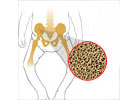According to a study, women who reported eating a diet rich in iron were 30 to 40 percent less likely to develop pre-menstrual syndrome (PMS) than women who consumed lower amounts.

Women in the study completed three food frequency questionnaires over the 10-year study period. After 10 years, 1,057 women were diagnosed with PMS and 1,968 remained free from PMS. Adjusting for calcium intake and other factors, the researchers then compared previous mineral intake reported by the women diagnosed with PMS with that of women who had few or no menstrual symptoms.
"We found that women who consumed the most non-heme iron, the form found primarily in plant foods and in supplements, had a 30 to 40 percent lower risk of developing PMS than women who consumed the lowest amount of non-heme iron," says Bertone-Johnson. Women in the highest intake group for non-heme iron had a relative risk of PMS of 0.60 compared to women in the lowest intake group.
She adds, "We also saw some indication that high intake of zinc was associated with lower risk. In contrast, we were somewhat surprised to find that women consuming the highest amount of potassium had a higher risk of being diagnosed with PMS than women consuming the lowest amount of potassium. In general, results for mineral from food sources and minerals from supplements were similar."
Overall, "Our findings need to be replicated in other studies. However, women at risk for PMS should make sure they are meeting the RDA for non-heme iron and zinc."
"The level of iron intake at which we saw a lower risk of PMS, roughly greater than 20 mg per day, is higher than the current recommended daily allowance (RDA) for iron for premenopausal women, which is 18 mg per day," Bertone-Johnson says. This amount may be obtained in 1 to 1.5 servings per day of iron-fortified cereal or with supplements.
Advertisement
The unexpected finding of higher PMS risk with high potassium intake, even at levels below current recommendations of 4,700 mg per day, may be related to potassium's role in regulating fluid balance in the body. It may affect PMS symptoms such as swelling in the extremities and bloating by affecting fluid retention. "More studies of potassium and menstrual symptoms are needed to better understand this," they say.
Advertisement
Intake of other minerals, including magnesium, copper, sodium and manganese were not associated with PMS risk, the authors point out.
Source-Eurekalert












